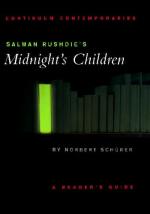|
This section contains 9,086 words (approx. 31 pages at 300 words per page) |

|
SOURCE: Teverson, Andrew S. “Fairy Tale Politics: Free Speech and Multiculturalism in Haroun and the Sea of Stories.” Twentieth Century Literature 47, no. 4 (winter 2001): 444-68.
In the following essay, Teverson explores Salman Rushdie's Haroun and the Sea of Stories as “a complex allegory that emphasizes the importance of exchange between different cultural groupings,” comparing it with such works as Arabian Nights, Jonathan Swift's Gulliver's Travels, and Lewis Carroll's Alice in Wonderland.
Jacobites must speak in children's rhymes, As preachers do in Parables, sometimes.
Pynchon (350)
Late in his life, either in the latter decades of the twelfth century or the first decades of the thirteenth, there is evidence that Farid ud-Din Attar, the Sufi mystic and poet, fell afoul of the Persian authorities and was charged with heresy. He had, according to Edward G. Browne, “aroused the anger and stirred up the persecuting spirit of an orthodox theologian” who denounced...
|
This section contains 9,086 words (approx. 31 pages at 300 words per page) |

|


